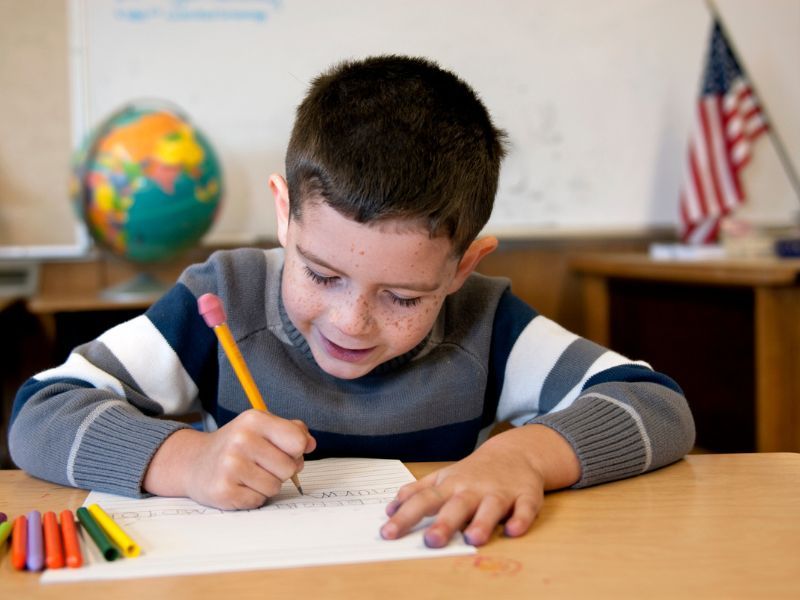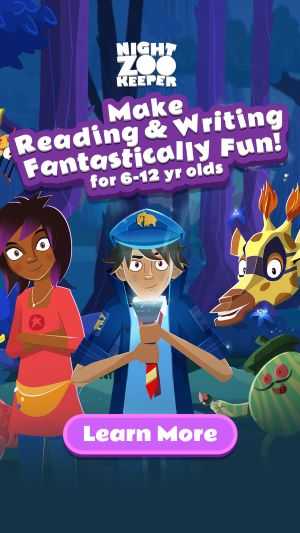Grade 4 Language Arts
Discover Grade 4 standards

Home > Language Arts > Grade 4
The fourth-grade language arts curriculum focuses on enabling students become more independent and analytical in their work. As they engage in more complex writing tasks, children learn to research, organize, and present their ideas effectively. In doing so, they strengthen their reading comprehension, build their vocabulary, and start to utilize more complex grammar and punctuation.

Reading
In Grade 4, children transition from simply reading fluently to thinking critically about what they read. Using reading comprehension strategies learnt in earlier grades, they start to summarize key ideas, infer meanings, and discuss character motivations. Fourth graders also focus on distinguishing between different text types, such as narratives, non-fiction, and poetry, and develop the ability to compare and contrast ideas from multiple texts.
Children develop their independent word reading in fourth grade using phonics, syllabication patterns, and knowledge of affixes to decode more complex words. Young learners are encouraged to flip through texts to find evidence and support their answers, and use answer keys to check their comprehension during reading activities.
Spelling
In fourth grade, children build on the spelling strategies learned in earlier grades and focus on the learning following word types:
- homophones (such as 'knight' and 'night')
- words with silent letters (e.g. 'known')
- prefixes and suffixes ('under-,' 'over-,' and 'pre-'; '-cious,' '-tious,' '-cial,' and '-tial')
- abbreviations
Alongside taught vocabulary, fourth graders are encouraged to regularly use dictionaries and thesauruses to look up new words they encounter, and learn synonyms and antonyms.
Grammar
In Grade 4, children are introduced to concepts such as relative pronouns, helping verbs, and progressive verb tenses, all of which help add variety and depth to their sentences. Fourth graders also focus on mastering the correct order of adjectives, and prepositions and prepositional phrases, which help connect nouns, verbs, and pronouns to the rest of the sentence by providing details about time, place, and manner. They practice using relative pronouns like "who" and "which," as well as relative adverbs like "when" and "where," and apply helping verbs and modal auxiliary verbs like "can" and "might" to express possibilities.
Punctuation
Grade 4 students build on their understanding of basic punctuation while learning new, more complex punctuation rules. A key focus is on using quotation marks and commas. Children are taught how to correctly punctuate direct speech and quotes from a text or referring to book titles, and how to use commas to separate items in a list, punctuate dates, and addresses, and structure more complex sentences. They also learn to use commas before coordinating conjunctions in compound sentences, ensuring that two independent clauses are connected correctly and clearly.
Writing
In Grade 4, children continue to build upon the writing skills they developed in earlier grades, taking on more independent and analytical writing tasks. They learn to research topics, organize their ideas, and produce well-structured writing pieces. They refine their writing through planning, revising, and redrafting, often using technology and workbooks to improve their work.
Students focus on three main types of writing: opinion, informative, and narrative. In opinion writing, they learn to develop strong arguments supported by evidence and persuasive techniques. Informative writing emphasizes factual accuracy, organized presentation, and the use of topic-specific vocabulary. Narrative writing requires students to create stories with a clear structure, descriptive details, and well-developed characters, while using transitional words to guide the reader through an engaging plot.
How Night Zookeeper can help

Night Zookeeper is an award-winning language arts program designed to make reading and writing fantastically fun for kids! It features interactive games, skill challenges, creative writing prompts and engaging lesson series to build all your child's language arts skills. Our qualified tutors also give your child constructive, personalized feedback on their writing.
Sign up today for a free 7-day trial!
Related articles


Make Reading & Writing Fantastically Fun!
- Award-winning reading & writing program for kids
- Improves spelling, grammar, punctuation & vocabulary
- Over 1,000 different learning games and activities



